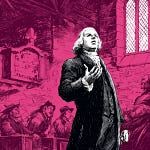Question 42: How does the Holy Spirit reveal God’s glory and works in the natural created order?
Answer: As the giver and sustainer of life, the Holy Spirit, at the direction of the Father and the Son, has revealed God’s glory in the natural revelation of creation by giving life and breath to all creatures, and by forming and sustaining the entire order of creation. As the Holy Spirit continues to sustain all things living and created, so also he continues to unfold and reveal the glory of God in creation to all mankind.
Breathing. It’s the most basic life-sustaining thing that we need and do, and yet almost never do we pay attention to it. At least, for most of us. It is one of the most basic indicators of life, it is the first thing that we need to do as we leave the womb of our mother. There is nothing we need so much as air. Without it, we would perish in a matter of minutes. Perhaps we take our breath for granted. Perhaps we should be more thankful for it. Perhaps we should be more aware of how important this really is. Breathing. Perhaps we should recognise that every breath we take is a gift from God.
In the ancient words of the Nicene Creed we confess of the Holy Spirit that: “We believe in the Holy Spirit, the Lord, the giver of life.” Have you ever considered that title that the Church of all ages has confessed concerning the Holy Spirit? We confess that he is “the Lord, the giver of life.” What does that mean? Is he the giver of spiritual life only? Is he the giver of all life to believer and unbeliever alike? Is this confession in the creed talking about something else entirely? Well, let’s consider this and build from the ground up here.
God himself exists as the ultimate ground and source of all that is, was, or will be (see: Question 51). This is fundamental to the doctrine that God is truth. Following on from this, we have considered that the created order was made by him and is sustained by him (see Question 102). In Question 11 we went on to consider how God created all things: Question 11: How did God create all things? Answer: Through Christ, who is the Word of God and the very word of his power, God created all things and upholds them continually for his good pleasure. As we are turning our attention now to the Holy Spirit as the revealer of truth, it should come as no surprise to us that he had a key role to play in God’s acts of revelation-creation at the beginning of time (all three persons of the Godhead were active in creation). Indeed, the Holy Spirit’s presence is explicitly noted in only the second verse of holy writ: “The earth was without form and void, and darkness was over the face of the deep. And the Spirit of God was hovering over the face of the waters” (Gen 1:2). Let’s dive in a bit deeper here and ask: Just what was the role of the Holy Spirit at creation?
The role of the Holy Spirit, not only in the initial act of creation, but of the daily sustaining of the created order, is far more significant than we might realise. Of course, God the Spirit was present and active at creation (Gen 1:2), scripture confirms it, and to suggest that the third person of the Trinity was an inactive bystander at creation (which is the logical alternative) is immediately and obviously ludicrous. God created all things, and so God the Holy Spirit (being God) was active in creation alongside, and at the direction of, the Father and the Son. The Westminster Confession of Faith states the matter plainly: “It pleased God the Father, Son, and Holy Ghost… in the beginning to create, or make of nothing, the world, and all things therein whether visible or invisible” (WCF 4.1). In that great creation Psalm, Psalm 104, we have the clear testimony of the Spirit’s active role in creation: “When you send forth your Spirit, they are created, and you renew the face of the ground” (Ps 104:30).
More particularly, we can fairly say that the Holy Spirit is the common animating force of life in every living being. In Genesis 2:7 we read that the “Lord God formed the man of dust from the ground and breathed into his nostrils the breath of life, and the man became a living creature.” Job 32:8 confirms this for us: “But it is the spirit in man, the breath of the Almighty, that makes him understand.” Another name for the spirit of man is the breath of the Almighty, which is a clear reference to the Holy Spirit. Again Job confesses: “The Spirit of God has made me, and the breath of the Almighty gives me life” (Job 33:4). The animating life force of every human being is a present, creative act of the Holy Spirit. J.V. Fesko puts it in simple and clear language for us: “the Holy Spirit is the author and sustainer of all life” (Fesko, Giver of Life, p.11). In this sense, the Holy Spirit is the immediate giver of the life force of every person.
The Spirit’s common and gracious gift of life to all living things is not only imparted at the point of creation, but it is also sustained throughout our lives. Job again makes this perfectly clear: “If he should set his heart to it and gather to himself his spirit and his breath, all flesh would perish together, and man would return to dust” (Job 34:14-15). If the Holy Spirit withdrew from creation, we would all die in a moment. The Holy Spirit is the animating principle of life in all of us – believer and unbeliever alike. Life is, indeed, God’s common gift to all things living. As Charles Hodge puts it, “The Holy Spirit is “present with every human mind” (Hodge, Systematic Theology, 2:667).
Ponder this for a moment. Pause and listen to your own breathing. Breathe in, breathe out. Breathe in, breathe out. It is the Holy Spirit’s common, present force of life by which you are breathing. Your breath is a gift from God, the very breath of the Almighty, sustained – moment by moment – by the Holy Spirit in your body. That is likewise true for every person. Look at your children, your spouse, your friends. Consider your neighbours. Notice the rise and fall of their chests – it is God’s grace, and a tangible indication of the common, gracious presence of the Holy Spirit. Their breath is the common and gracious sustaining work of God the Holy Spirit, the Lord, the Giver of Life. Have you noticed someone breathing, and realised that you are watching the unfolding work of the Holy Spirit in that moment?
This insight is humbling, is it not? I wonder if you can think of a time when you have been utterly and completely at the mercy of another person. When I was a small child, I can remember being tickled by one of my parents. Tickling, when we are children, has the odd and unique distinction of combining instant joyful delirium with an exasperated and desperate desire to escape. It is simultaneously an experience of joy at being loved by your parent as they tickle you, wild unvolitional laughter at the tickling sensation itself, and a frenzied attempt to escape a situation that is almost completely beyond your control. And then there is that moment, when your Dad pauses for a second, you catch your breath, he looks at you, and you know he’s about to tickle you again... and there is absolutely nothing you can do to stop it (much as you may squeal and laugh in protest). It’s that feeling of being utterly and completely at the mercy of another person. There are other, more serious situations in which we may find ourselves to be completely at the mercy of another person as well.
At all times, the continuation of our lives is completely and utterly at the mercy of God. Our life is given and sustained by his good pleasure alone. At any moment, he might chose to withdraw the privilege of living, and he has appointed a day in which he will do just that (“appointed once to die”). On that day, soul and body will be sundered, and our spirit will return to him who gave it (Ecc). Who is to say when that day will be for you? God only knows. It may be that he is appointed your time to be within the space of the very next hour.
Our response to God for this basic gift of life, alongside every other common blessing of creation, ought to be a response of gratitude. In Romans 1:18-21 we read: “For the wrath of God is revealed from heaven against all ungodliness and unrighteousness of men, who by their unrighteousness suppress the truth. 19. For what can be known about God is plain to them, because God has shown it to them. 20. For his invisible attributes, namely, his eternal power and divine nature, have been clearly perceived, ever since the creation of the world, in the things that have been made. So they are without excuse. 21. For although they knew God, they did not honor him as God or give thanks to him…” One of the cardinal points of sin highlighted here in the fallen state of man is that he does not “give thanks” to God.
Every human being on the face of the planet is presently living by the grace and kindness of God. Their very ability to breathe is a constantly sustained gift of God’s goodness. And yet what is our natural, fallen response? To suppress even the thought of God!! Suppose some wealthy benefactor made a deposit of $5000 a day in your bank account. Would you rudely ignore that person when you saw them? How much more a world full of glory, blessings, and privileges – and yet we worship the gift while expressing our hatred for the Giver. We begin to see how heinous a thing sin really is.
Let us then live in the constant practice of gratitude. Let us a make a habit of responsive gratitude in every circumstance. Let us take up the psalms of thanksgiving on our lips. “I will give thanks to the Lord with my whole heart; I will recount all of your wonderful deeds” (Ps 9:1). “The Lord is my strength and my shield; in him my heart trusts, and I am helped; my heart exults, and with my song I give thanks to him” (Ps 28:7). “Enter his gates with thanksgiving, and his courts with praise! Give thanks to him; bless his name! Oh give thanks to the Lord; call upon his name; make known his deeds among the peoples!” (Ps 100:4-5). SDG.
1. Question 5: Why do we say that God himself exists as the ultimate ground and source of all that is, was, or will be? Answer: We say that God himself exists because holy scripture affirms it, and the creation itself bears witness to his divine power and majesty. Furthermore, we say that he is the ultimate ground and source of all that is, was, or will be because by faith in his word we perceive that he made all things.
2. Question 10: What do we mean when we say that all truth proceeds from God? Answer. All truth proceeds from God means that the created order, being God’s natural revelation of his own glory, was made by him, is sustained by him, and is designed to conform to his purposes.













Share this post